Why does choosing the right seo audit tool matter? In today’s digital-first business environment, your website is more than a marketing channel, it’s your most powerful sales representative. Yet, according to research very few small businesses perform an SEO audit, leaving performance issues hidden for months or even years. Without routine checks, sites risk slow speeds, broken links, and invisible errors that silently drain traffic and credibility.
This raises a critical question: Which tool is best for an SEO audit?
An SEO audit tool scans your website for technical, on-page, and off-page factors, then gives actionable insights to improve search visibility. But no two tools are identical. Some focus on technical health, others highlight content and keyword performance, while a few deliver all-in-one marketing intelligence.
In this expanded guide, we’ll break down:
- What SEO audits are and why they’re critical
- The best SEO audit tools in 2026 and their strengths
- How to select the right tool based on business type
- Frequently asked questions from decision-makers
- Actionable next steps for businesses serious about ranking higher
By the end, you’ll have clarity on which tool aligns best with your organization’s SEO and growth objectives.
What Is an SEO Audit and Why Is It Essential?
Think of an SEO audit as a health check for your website. Just as a business leader reviews quarterly financials, a website needs regular diagnostics to ensure it’s working as intended.
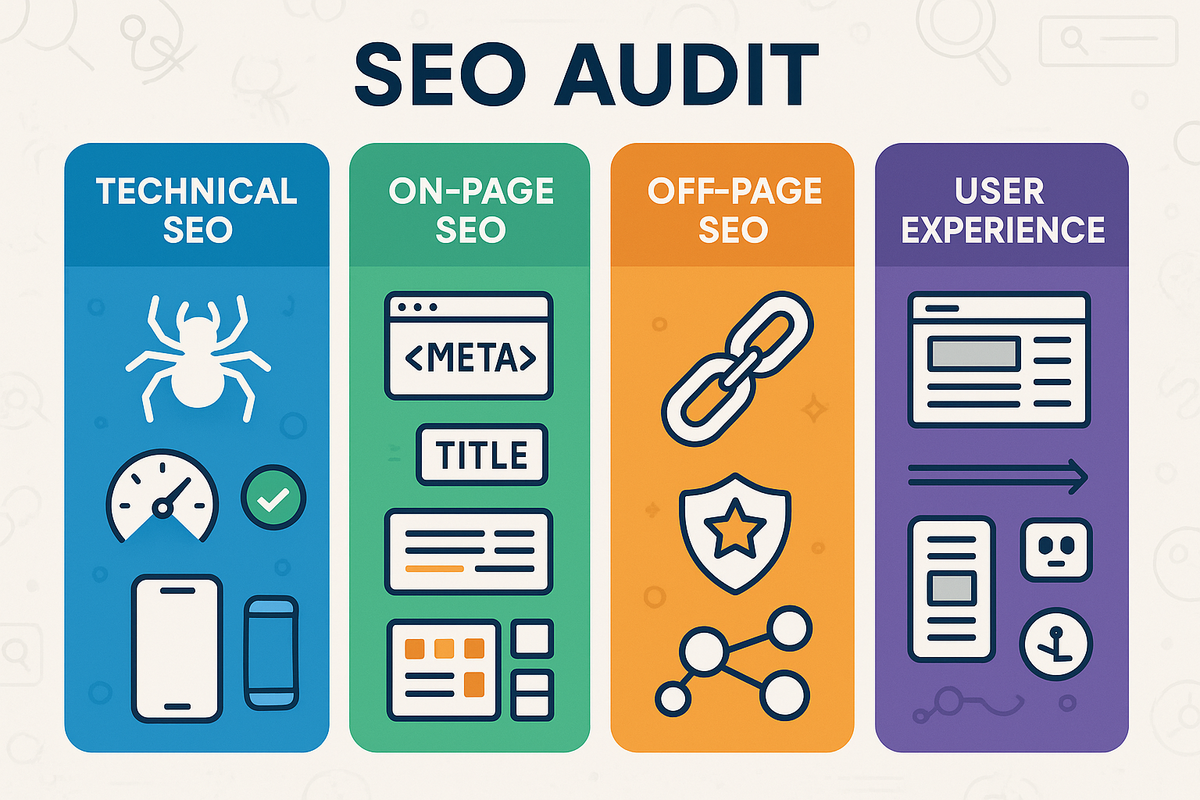
An SEO audit typically covers four core areas:
- Technical SEO – Crawlability, indexation, site speed, and mobile responsiveness
- On-Page SEO – Meta tags, title tags, keyword placement, and content structure
- Off-Page SEO – Backlinks, authority, and social signals
- User Experience (UX) – Page navigation, mobile-friendliness, and accessibility
Why Businesses Need SEO Audits?
- Detect issues: From 503 status code is a server error, but it can hurt rankings.
- Stay competitive: Competitors running regular audits can outrank you without better content, simply because their technical foundation is stronger.
- Ensure compliance: Google algorithm updates demand constant adjustments. Audits reveal where you’re falling short.
- Improve ROI: Every improvement compounds over time, boosting organic traffic without increasing ad spend.
Paired with SEO services, an audit becomes more than a checklist it becomes a roadmap to digital authority. For brands, agencies and industries like Oil, Gas, and Renewables are especially vulnerable, where technical SEO missteps can disrupt tender visibility or compliance documentation.
8 Best SEO Audit Tools That Lead the Market
To answer which tool is the Best SEO Audit tool, let’s evaluate today’s leading solutions. Each tool brings unique strengths, making the “best” one dependent on your goals.
When considering your options, you may also want to look into website SEO audit services to ensure you're tracking progress effectively and accurately.
1. Google Search Console
If you’re just starting out, Google Search Console (GSC) should be your first stop. Since it’s Google’s own tool, its data is both accurate and essential.
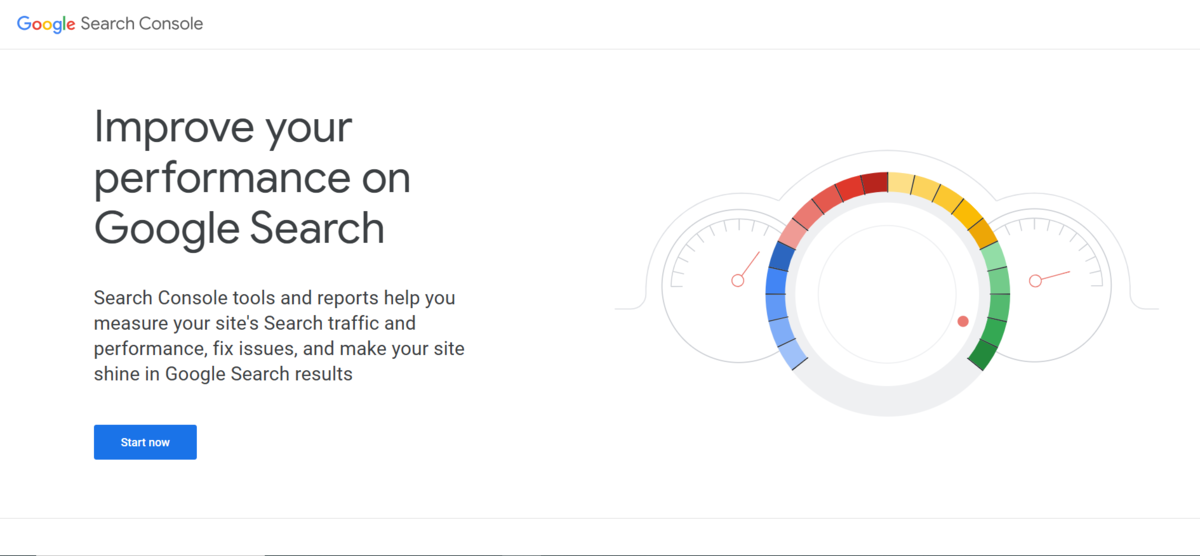
Strengths:
- Reports directly from Google
- Index coverage and crawling alerts
- Keyword impression and click data
- Mobile usability checks
Use Case Example: A local business owner uses GSC to discover a not-indexed page due to crawl errors. Fixing those issues results in immediate visibility improvements.
Limitations:
- Lacks competitive insights
- Minimal backlink data
Best for: Small businesses and startups beginning their SEO journey.
2. SEMrush
SEMrush is a comprehensive suiteable tools that cover various aspects of marketing professionals.
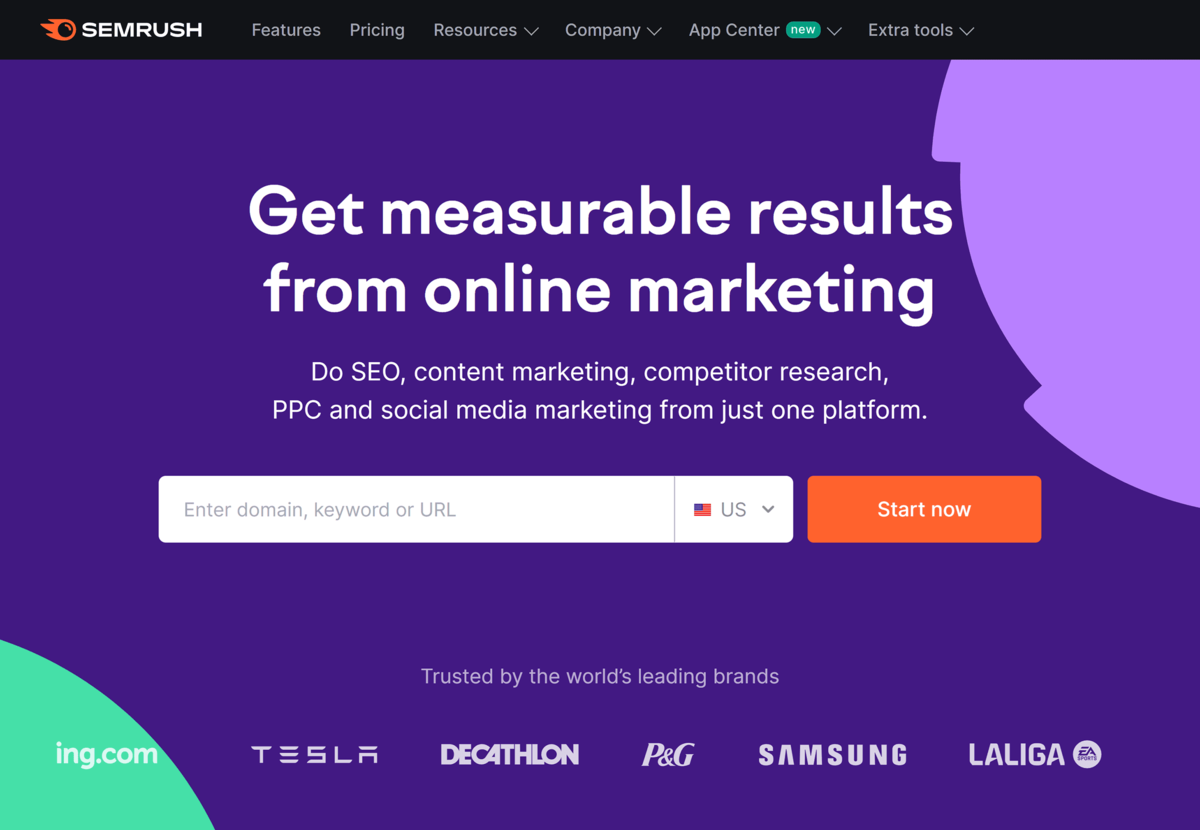
Strengths:
- Site health scoring with actionable tips
- Toxic backlink detection
- Keyword gap analysis against competitors
- Content optimization suggestions
Use Case Example: A mid-size company runs an SEMrush audit and finds that most of its blog posts lack internal links. After implementing recommendations, they see an increase in average session duration.
Limitations:
- It can be overwhelming for beginners
- Pricing may deter smaller firms
Best for: Best SEO company for Google that wants a comprehensive best SEO audit software to manage multiple campaigns.
Let's Grow Your brand with Our Tool
3. Ahrefs
When it comes to backlink audits, no tool rivals Ahrefs. Known for its massive link database, it’s invaluable for businesses where authority and off-page SEO are critical.
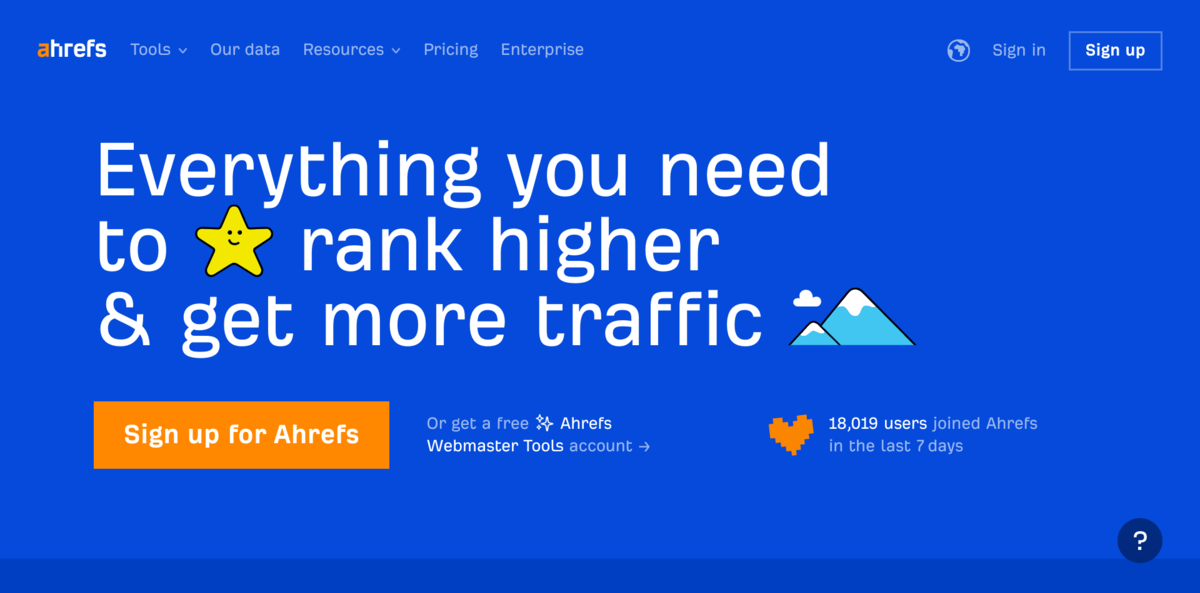
Strengths:
- Largest backlink index
- In-depth competitor link comparisons
- Broken link detection
- Technical audits through its Site Audit feature
Use Case Example: Such Companies use Ahrefs to identify broken backlinks pointing to old product pages. By redirecting and reclaiming them, they gain a quick boost in authority
Limitations:
- Doesn’t provide robust on-page content optimization
- Premium pricing
Best for: Businesses focusing on link building and authority.
4. Screaming Frog
For technical SEO audits, Screaming Frog is widely regarded as one of the most reliable. Unlike cloud tools, it runs as a desktop crawler, making it fast and highly customizable.
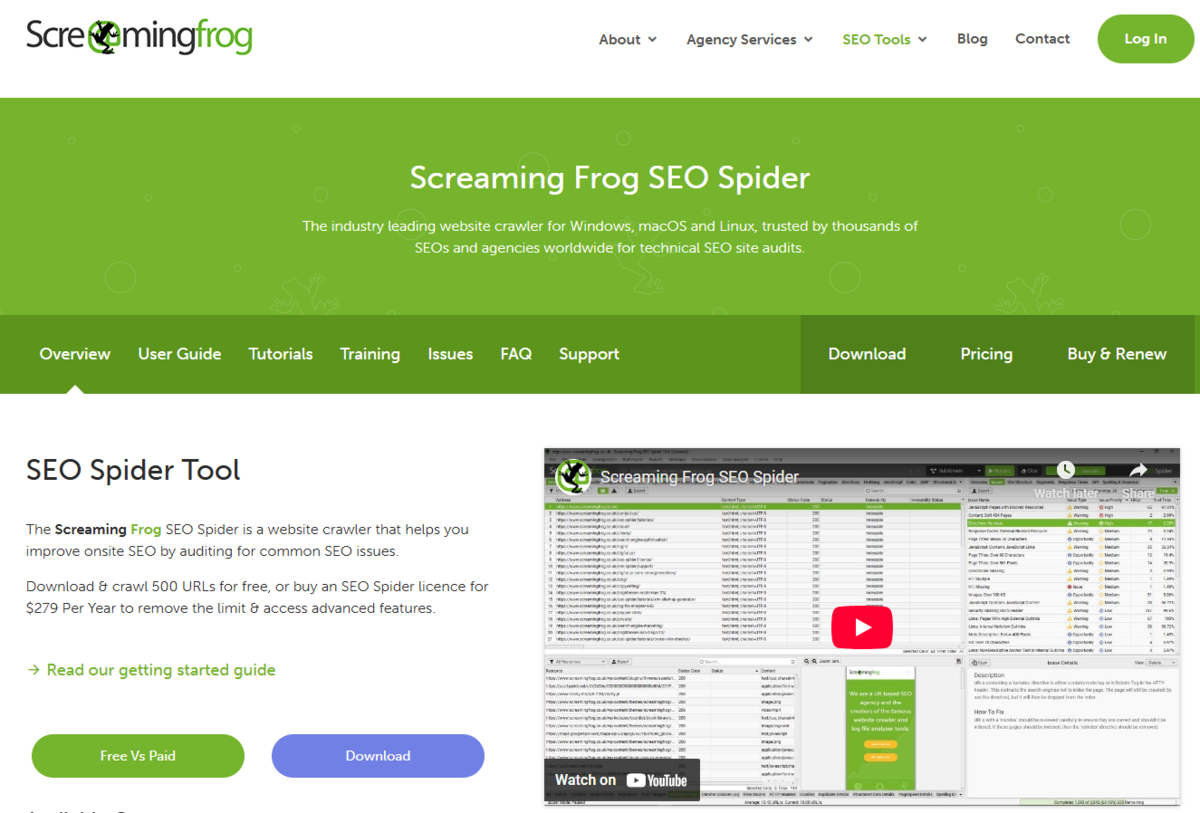
Strengths:
- Deep site crawls up to 500 URLs free (unlimited paid)
- Identifies redirects, duplicate content, and metadata issues
- Customizable filters for technical audits
Use Case Example: A large marketing firm with a 5,000-page website uses Screaming Frog to detect multiple redirect loops slowing down crawlability. Once fixed, their indexation rates improve dramatically.
Limitations:
- Lacks design-friendly reporting
- Geared toward technically skilled teams
Best for: IT managers and developers in charge of complex websites.
5. Moz Pro
Moz Pro is often chosen by marketing teams who want ease of use paired with reliable SEO insights.
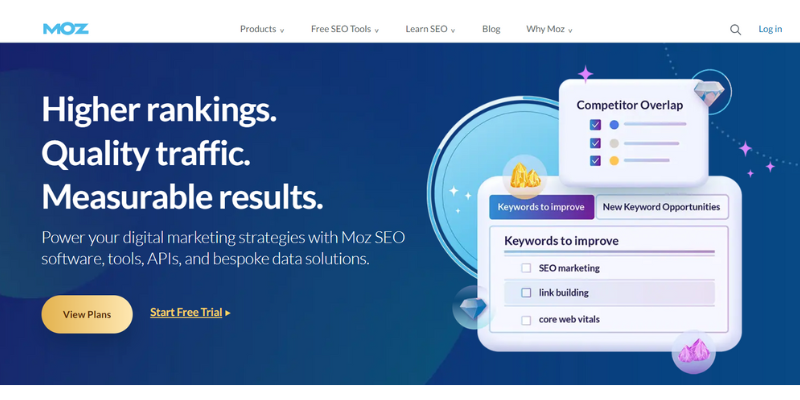
Strengths:
- Crawl diagnostics with prioritization
- On-page optimization reports
- Domain authority and spam score tracking
- Beginner-friendly interface
Use Case Example: A b2b marketing agency uses Moz to run monthly audits for its clients, quickly identifying duplicate title tags and thin content. This leads to steady improvements across client sites.
Limitations:
- Smaller backlink database compared to Ahrefs
- Some features lack depth
Best for: Marketing teams and SMBs seeking a balance between simplicity and capability.
6. Sitebulb
Sitebulb is gaining popularity for its highly visual audit reports that make it easy to explain complex SEO issues to stakeholders.
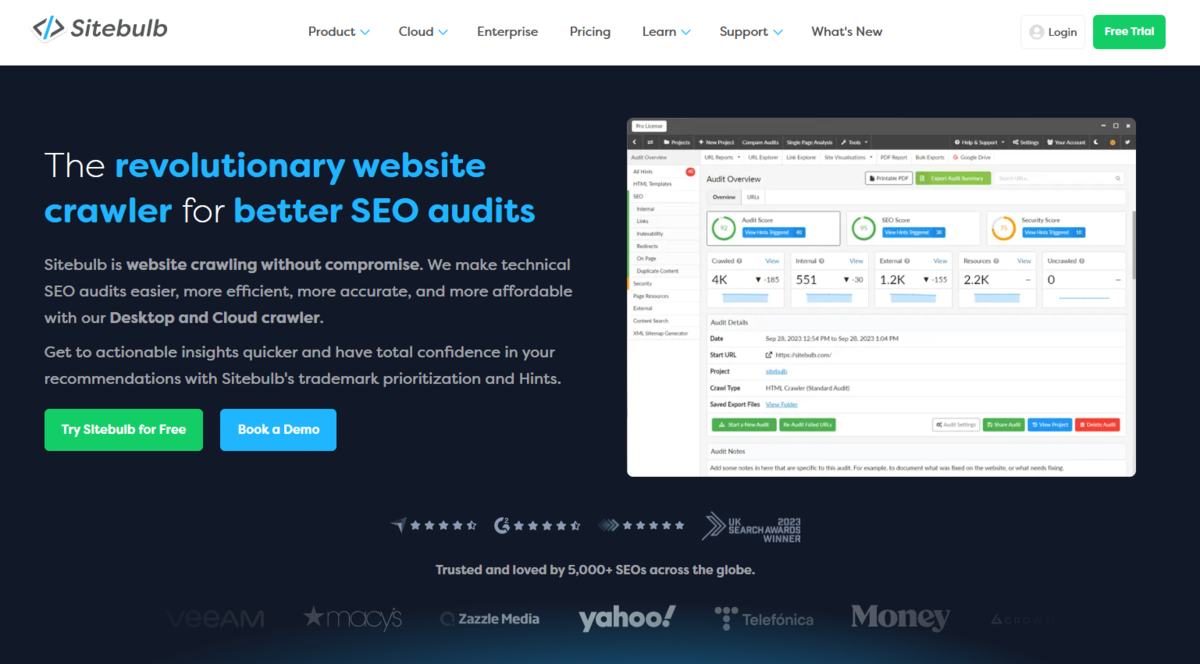
Strengths:
- Visualized crawl paths
- HTTPS and security checks
- Accessibility reporting for WCAG compliance
Use Case Example: A company presents Sitebulb’s crawl visualization to non-technical executives, making it easier to secure budget for technical SEO fixes.
Limitations:
- Desktop installation required
- More technical than marketing-focused
Best for: Teams needing visual storytelling in audits.
Get Your Ai Website SEO Audit Today
7. SEO Report
This SEO Report tool provides comprehensive SEO analysis reports for websites instantly, transforming complex data into easy-to-understand insights that help improve site performance.
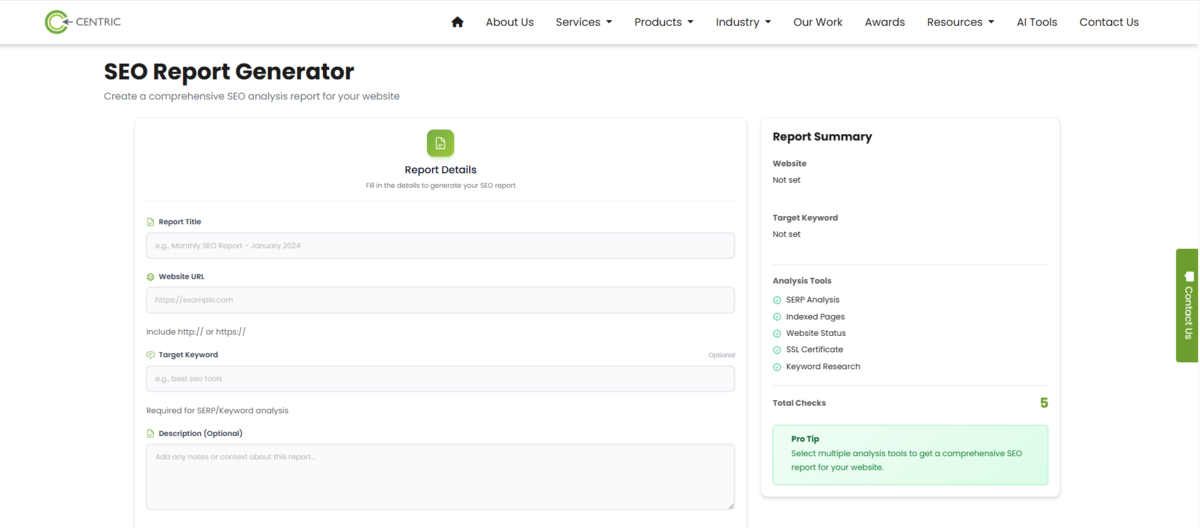
Strengths:
-
Lightning-fast report generation in under a minute.
Use Case Example: An e-commerce SEO company manager runs a pre-launch audit on a new product page, identifying duplicate content issues and receiving a detailed report and share with the dev team for quick fixes.
Limitations:
-
Lacks advanced backlink analysis, relying on external tools for link audits.
-
Some features lack depth
Best for: Freelancers and small teams needing on-demand audits.
Try Our SEO Report Generator Tool
8. AI Audit
AI Audit tool focuses on analyzing content in specific queries and providing an overall grade of the optimized paragraph.
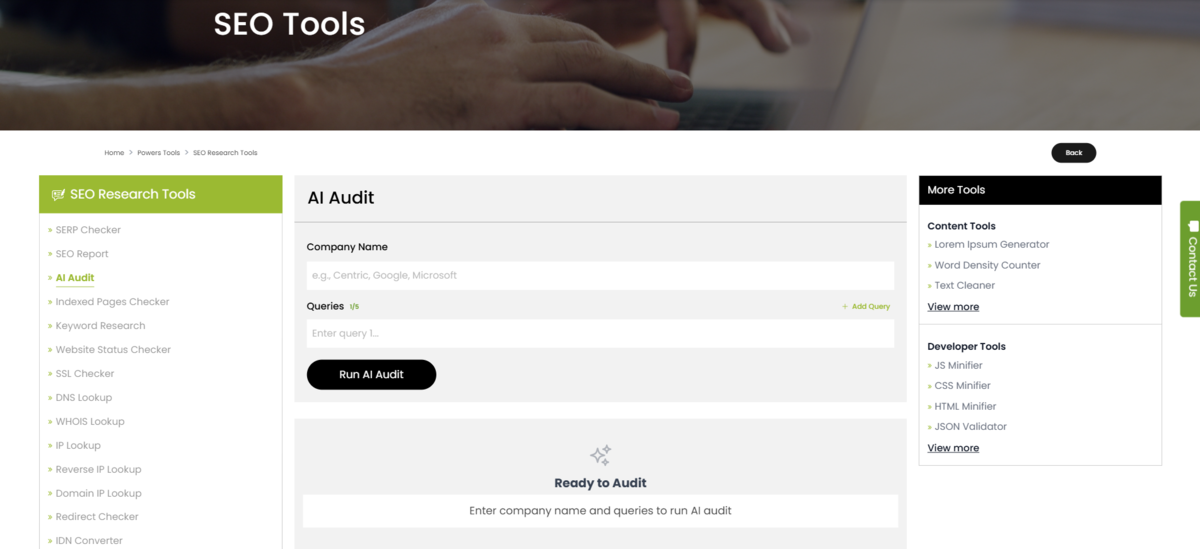
Strengths:
-
Analyzes content in specific queries to ensure relevance.
-
Provides an overall grade to assess the quality of the optimized paragraph
Use Case Example: A content strategist uses the tool to analyze a product description, receiving a detailed grade that highlights areas for optimization.
Limitations:
-
Primarily text-based; doesn't handle image or video mentions.
-
Requires manual input for non-English languages, reducing global scalability.
Best for: Brands expanding into AI-influenced content marketing.
SEO Audit Tool Comparison: Find the Right Fit for Your Needs
Here’s a quick snapshot to help you choose the right tool based on your business type and audit needs.
| Tool Name | Ideal For | Key Strengths | Potential Limitations | Recommended Business Type |
|---|---|---|---|---|
| Google Search Console | Beginners / micro‑businesses | Direct Google data, free, mobile usability reports | Limited backlink & competitive data | Start‑ups, small local businesses |
| SEMrush | Full‑suite marketing & agencies | Comprehensive audit + keyword & competitive insights | Steeper learning curve, higher cost | Mid‑sized firms with SEO teams |
| Ahrefs | Authority & backlink focus | Massive link database, detailed off‑page audits | Weaker on content optimization | Businesses with heavy link strategies |
| Screaming Frog | Technical SEO teams | Deep crawl capabilities, excellent for large sites | Less “cute” reporting, desktop only | Large/complex websites, IT‑driven |
| Moz Pro | Marketing teams & SMBs | Easy interface, on‑page & crawl diagnostics | Smaller link database compared to Ahrefs | SMBs, in‑house marketing teams |
| Sitebulb | Visual presentations & enterprise | Visual crawl maps, accessibility/security checks | Desktop install, more technical focus | Enterprises, agencies needing stakeholder‑visible reports |
| SEO Report Generator |
Freelancers, small agencies, in-house teams | Instant (<10 sec), simple reports, on-page + Core Web Vitals + basic rankings, 100% free & unlimited |
No deep backlink analysis, lighter on technical crawl depth |
Freelancers, small-medium agencies, consultants closing deals fast |
| AI Audit |
Content writers, content marketers, brands using AI search | Grades content against a specific target query, instant optimization feedback |
Text-only (no images/videos), manual input needed for non-English |
Brands & writers optimizing for Google AI Overviews / SGE |
How Regular SEO Audits Can Supercharge Your Website’s Performance and Boost ROI?
Regular SEO audits are not just a one-time fix, but a long-term strategy for maintaining your website's health and optimizing its performance. Much like routine maintenance for a vehicle, conducting SEO audits regularly ensures that your website remains in top condition, capable of delivering the best user experience and driving the highest possible traffic.
Here’s how regular SEO audits can directly impact your website’s performance and ROI:
-
Identify and Fix Hidden Issues: SEO audits help uncover problems that might not be immediately obvious, such as broken links, slow page load times, or technical errors that are silently harming your rankings. By fixing these issues, you’re ensuring that your site runs smoothly and doesn’t lose traffic due to overlooked problems.
-
Stay Ahead of Algorithm Updates: Google and other search engines frequently update their algorithms. Regular audits ensure that your website remains compliant with the latest SEO best practices. Failing to keep up with these updates can result in a drop in rankings, but a proactive audit strategy ensures that you stay ahead of the curve.
-
Optimize for Better User Experience: Regular SEO audits go beyond technical fixes—they also evaluate your site's user experience (UX). Optimizing your website for better navigation, mobile responsiveness, and accessibility leads to a better overall experience for your visitors, which can reduce bounce rates and increase conversions.
-
Maximize Your Content and Keyword Strategy: SEO audits help you assess the performance of your content and keywords, ensuring that you are targeting the right terms that attract your ideal audience. By fine-tuning your content based on audit insights, you can improve visibility and engagement, leading to more qualified leads and higher conversions.
-
Improve ROI Over Time: By addressing the issues revealed in regular SEO audits, you’re ensuring that your website continuously improves. Over time, the compounded effect of fixing minor issues and optimizing for better performance results in increased organic traffic and higher rankings.
Frequently Asked Questions
Which SEO audit tool is best for beginners?
Google Search Console is the best starting point because it’s free, simple, and gives direct insights from Google. It covers indexing, errors, and keyword performance, making it perfect for entry-level audits.
Which tool is best for technical SEO audits?
Screaming Frog and Sitebulb are ideal for technical audits. They crawl your website deeply, flagging issues like duplicate content, redirects, and metadata gaps that could harm SEO rankings.
Which SEO audit tool is best for backlink analysis?
Ahrefs is widely regarded as the leader in backlink audits. It has one of the largest backlink databases, making it excellent for tracking link health and spotting new link-building opportunities.
Do I need more than one SEO audit tool?
Yes, combining tools often delivers the most complete picture. For example, pairing SEMrush for keyword and competitor insights with Ahrefs for backlinks covers both content and authority.
How often should I run an SEO audit?
Most businesses benefit from quarterly SEO audits. However, larger sites or highly competitive industries should consider monthly audits to stay ahead of algorithm updates and technical issues.
Conclusion
An SEO audit is essential for businesses to maintain website performance and visibility in today’s competitive digital landscape. By addressing issues in technical SEO, on-page optimization, and off-page factors, businesses can improve search rankings, user experience, and ROI. Choosing the Best SEO Audit Tool is crucial to uncover hidden issues and optimize your website.
Whether you're a small business or a large enterprise, tools like Google Search Console, SEMrush, and Ahrefs cater to different needs, helping businesses stay ahead of the competition. SEO is an ongoing process. Regular SEO auditing services with the right tools ensure your website adapts to algorithm changes and continues to grow. Investing in an SEO audit tool is investing in your site's long-term success. Start optimizing your site today with the best SEO audit report and position your business for future growth.
Start optimizing your site today with the best SEO audit report from Centric, and position your business for future growth.









